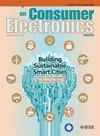Energy Optimization in Consumer Lightings: An IoT-Based Adaptive Control Mode
IF 4.3
2区 计算机科学
Q1 ENGINEERING, ELECTRICAL & ELECTRONIC
引用次数: 0
Abstract
This study addresses the limitations of conventional lighting systems, which often fail to adapt to dynamic changes in occupancy, daylight availability, and user preferences, resulting in significant energy waste and compromised user comfort. To address these shortcomings, this study presents a cost-effective & highly efficient real-time IoT-enabled adaptive lighting control model that incorporates a time-varying gain controller, passive infrared (PIR) sensor, Pulse width modulated (PWM) LED light sensors, and an adaptive processing unit within a feedback loop to optimize lighting for energy efficiency and user comfort. In addition to this a data-driven approach has been used for zone division, reference generation and occupancy mapping which helps to enhance adaptability across diverse environments. The proposed model dynamically adjusts the lighting levels by integrating real-time user input, daylight harvesting, and occupancy mapping. The real-time experimental validation demonstrates a 35% reduction in energy consumption compared to traditional methods, with a discounted payback period of 3.68 years. The figure of merit (efficiency/cost) of 33.3%, demonstrating comparability to current state-of-the-art systems and highlighting the potential for substantial cost reductions and energy savings. Future research will address sensor calibration challenges, investigate the effects of extended LED dimming, and explore advancements in scalability and predictive control integration.消费照明中的能源优化:基于物联网的自适应控制模式
该研究解决了传统照明系统的局限性,传统照明系统往往不能适应占用率、日光可用性和用户偏好的动态变化,导致严重的能源浪费和用户舒适度降低。为了解决这些缺点,本研究提出了一种经济高效的实时物联网自适应照明控制模型,该模型结合了时变增益控制器、被动红外(PIR)传感器、脉宽调制(PWM) LED光传感器和反馈回路中的自适应处理单元,以优化照明,提高能源效率和用户舒适度。除此之外,数据驱动的方法还用于区域划分、参考生成和占用映射,这有助于增强对不同环境的适应性。提出的模型通过集成实时用户输入、日光收集和占用映射来动态调整照明水平。实时实验验证表明,与传统方法相比,能耗降低35%,投资回收期为3.68年。价值值(效率/成本)为33.3%,显示了与当前最先进系统的可比性,并突出了大幅降低成本和节约能源的潜力。未来的研究将解决传感器校准挑战,研究扩展LED调光的影响,并探索可扩展性和预测控制集成方面的进展。
本文章由计算机程序翻译,如有差异,请以英文原文为准。
求助全文
约1分钟内获得全文
求助全文
来源期刊
CiteScore
7.70
自引率
9.30%
发文量
59
审稿时长
3.3 months
期刊介绍:
The main focus for the IEEE Transactions on Consumer Electronics is the engineering and research aspects of the theory, design, construction, manufacture or end use of mass market electronics, systems, software and services for consumers.

 求助内容:
求助内容: 应助结果提醒方式:
应助结果提醒方式:


